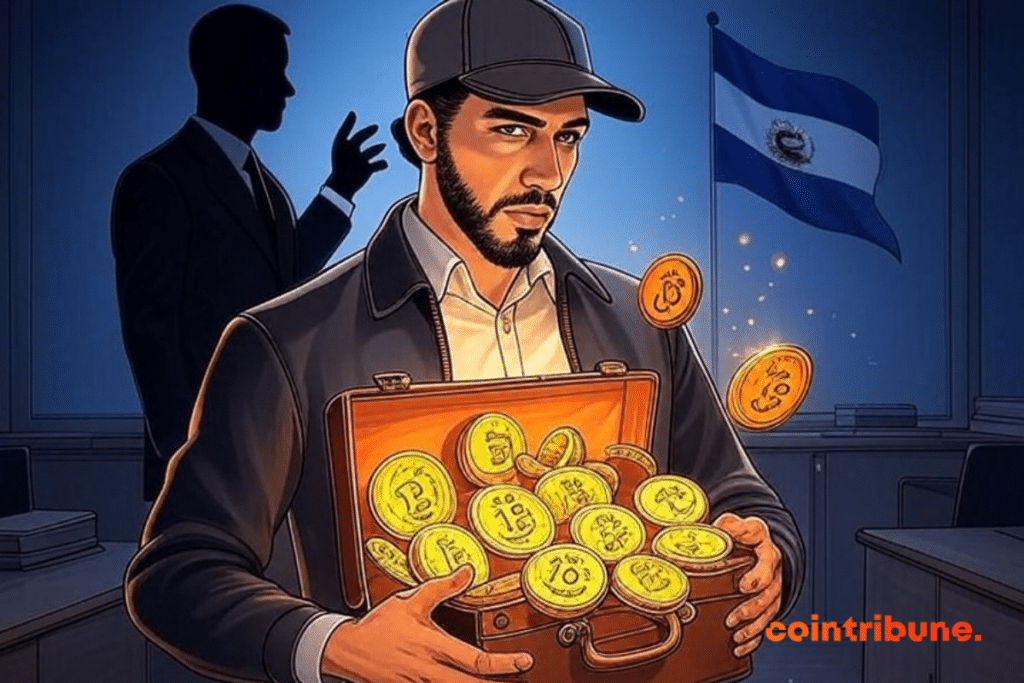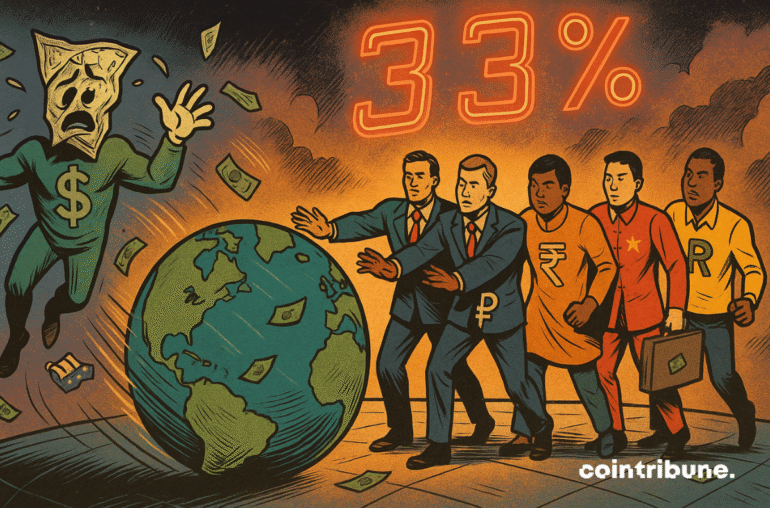8h05 ▪
5
min read ▪ by
Facing the IMF, El Salvador stands out as a troublemaker. While this international institution offers a $1.4 billion lifeline, the country quietly continues its crypto strategy. President Nayib Bukele keeps filling the nation’s coffers with bitcoin, apparently disregarding the agreement made. The latest addition? 240 more BTC since December 2024. A bold, almost cheeky strategy.

In brief
El Salvador added 240 bitcoins to its reserves despite the agreement signed with the IMF.
The IMF tolerates purchases through private entities to bypass the terms of the agreement.
Tether and Bitfinex settle in a Salvador transformed into a highly strategic crypto refuge.
Crypto remittances fall sharply despite promises of growth in the local digital economy.
Persistent accumulation despite the agreement: 240 new bitcoins in the coffers
Despite the agreement signed with the IMF at the end of 2024, which officially imposed a freeze on bitcoin accumulation, El Salvador kept buying. Since that date, 240 additional units have been added, bringing the total to 6,209 BTC. A stash estimated at $550 million, nearly 15% of the country’s foreign exchange reserves.
The trick? Purchases apparently do not go directly through public channels. Rodrigo Valdes, IMF regional director, confirms:
El Salvador still respects its commitment not to accumulate Bitcoin through the overall fiscal sector.
In other words, acquisitions would continue but through entities or classifications that fall outside the strict definition of the agreement.
Anndy Lian, blockchain advisor, points out:
The IMF’s flexible interpretation suggests purchases may involve non-public entities or reclassified assets.
A clever strategy that allows Bukele to maintain the image of a crypto-friendly country while still cashing in IMF aid.
A discreet IMF facing Bukele: bypass strategy or admission of powerlessness?
Has the IMF lost control? Officially, the agreement provided for abandoning bitcoin as legal tender and ending any government involvement in crypto assets. Yet, at the signing, Bukele proudly tweeted a screenshot: “It’s not over“, alongside a new bitcoin purchase.
This lack of firmness sparks criticism. The risk? Discrediting the IMF’s authority with other debtor countries. For some analysts, this “flexibility” is actually a diplomatic strategy to avoid offending Bukele, supported by major geopolitical allies.
Added to this is the rise of controversial crypto players such as Tether and Bitfinex, which have relocated their headquarters to El Salvador. Tether holds $143 billion in assets, more than 25 times the country’s reserves. This move is not trivial: it comes with a risk of interference and regulatory capture.
The companies in question are far from impeccable. Tether has already paid $41 million for misleading consumers. Bitfinex, meanwhile, was banned from operating in New York after an agreement with the attorney general. By tolerating these influences, the IMF helps establish a parallel financial ecosystem, outside any democratic control.
Reality in decline: crypto disillusionment sets in in Salvadoran daily life
While the president bets everything on bitcoin, the citizens are tuning out. The crypto remittance dynamic (money transfers sent from abroad) illustrates this growing disaffection.
Crypto remittances fell by 44.5% in the first quarter of 2025;
They represent only 0.52% of total money transfers;
In value: $16 million compared to $28.83 million last year at the same time;
March 2024 showed $8 million; in 2025, it caps at $6.92 million;
Throughout 2024, crypto remittances grew by only 3.1%.
Usage remains marginal despite educational efforts. Lightning wallet training has been launched. But in practice, the effect is limited. Joe Nakamoto recently joked on X:
Paying in Bitcoin in El Salvador… Does that mean things are free?
Daily life, however, is less funny. Several inhabitants have been expropriated for crypto-infrastructure projects. None of the major announcements — airport, train, Bitcoin City — has yet come to fruition. The crypto dream in El Salvador is beginning to crumble.
Yet Bukele stays the course. He continues to project El Salvador as a digital pioneer. Testament to this is his emblematic campaign: “one day, one bitcoin (BTC)”. Beyond the symbol, this policy shows a long-term commitment, even if it means going against traditional economic dogmas. A risky strategy, but consistent with his vision of monetary independence.
Maximize your Cointribune experience with our “Read to Earn” program! For every article you read, earn points and access exclusive rewards. Sign up now and start earning benefits.
La révolution blockchain et crypto est en marche ! Et le jour où les impacts se feront ressentir sur l’économie la plus vulnérable de ce Monde, contre toute espérance, je dirai que j’y étais pour quelque chose
DISCLAIMER
The views, thoughts, and opinions expressed in this article belong solely to the author, and should not be taken as investment advice. Do your own research before taking any investment decisions.




